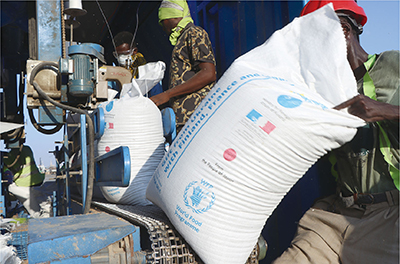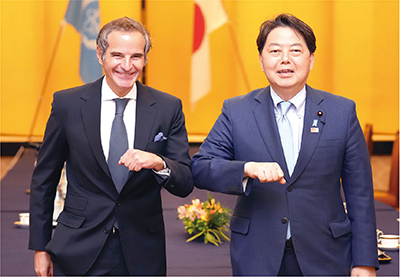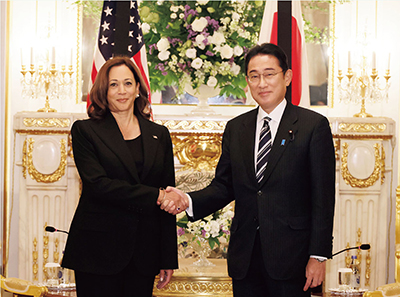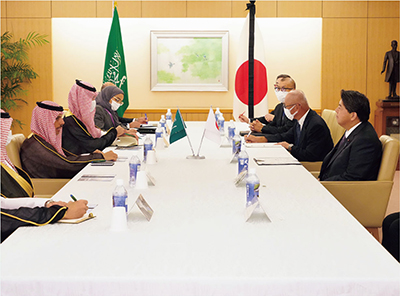Diplomatic Bluebook 2023
Special Feature
Russia's Aggression Against Ukraine and Japan's Response
4 Response to Negative Effects on the International Community
Russia's aggression has caused a global food and energy crisis, and its attacks on Ukraine's nuclear power plant as well as nuclear threats have caused concerns not only in Ukraine and neighboring countries but also around the world.
(1) Food and Energy Crisis
The shortages and high prices of food and energy supplies caused by Russia's aggression against Ukraine affect global economic activities. With regard to food, the disruption of grain exports from Ukraine through the Black Sea caused international prices of major grains to soar, and export restrictions by Russia on fertilizer materials also caused disorder in the international market, leading to a sharp rise in prices. In response to this situation, Russia has developed propaganda claiming that economic sanctions by Western countries are the cause of the soaring food prices, and is attempting to divide the international community. Furthermore, with regard to energy, Russia is using its energy resources to put pressure on countries that depend on imports for their energy supply. Access to affordable food and energy forms the basis for people to live with dignity. However, food and energy security, especially for the vulnerables in the international community, are being threatened.
Amidst this situation, in the field of food, through international organizations such as the WFP and FAO as well as bilateral assistance and Japanese NGOs, Japan has been providing food assistance and assistance for strengthening production capacity to countries facing food shortages as well as emergency food aid as humanitarian assistance to countries in the Middle East and Africa. On July 5, Japan decided to provide approximately 200 million US dollars in assistance to countries in need in the Middle East, Africa, and elsewhere as a response to global food security, which has deteriorated due to the effects of the situation in Ukraine.
For Asia, Japan will provide support for the ASEAN Plus Three Emergency Rice Reserve (APTERR) and the ASEAN Food Security Information System (AFSIS) within the framework of ASEAN Plus Three (10 ASEAN countries plus Japan, China, and the Republic of Korea (ROK)) toward achieving the Sustainable Development Goals (SDGs) based on human security.
In July 2022, the Black Sea Grain Initiative was agreed upon between the UN, Turkey, Ukraine, and Russia regarding the resumption of grain exports from Ukraine, a major grain exporting country. Japan has consistently supported this agreement and raised the importance of its implementation. On November 11, Japan decided to provide assistance to transport Ukrainian wheat donated by the Government of Ukraine to Somalia from the port of Odesa through the WFP for distribution in local areas. In December, the wheat was shipped from the port of Odesa via the Black Sea. Furthermore, from the perspective of promoting exports of grain produced in Ukraine, Japan provided support to Ukraine for simple grain storage facilities in order to expand grain storage capacity in the country, which had been in short supply due to the war.
 Ukrainian wheat transported from Ukraine to Somalia with Japanese assistance (©WFP/Jamal Ali)
Ukrainian wheat transported from Ukraine to Somalia with Japanese assistance (©WFP/Jamal Ali)Through such efforts, Japan has responded to resolve food insecurity around the world and to prevent food from being used for political purposes.
Toward stabilizing the energy market, Japan has urged resource-producing countries to increase their production and has cooperated with international organizations to release oil reserves. Furthermore, a portion of the liquefied natural gas (LNG) handled by Japanese companies was diverted to Europe in February and March 2022, taking into account the severe energy situation in Europe, including the situation in Ukraine. At the same time, in order to enable the international community to secure a stable energy supply while breaking away from its dependence on Russia, which is exerting pressure by using its energy resources, Japan is promoting and supporting efforts toward a realistic energy transition, including diversification of crude oil and natural gas supply sources, and utilization of hydrogen, ammonia, renewable energy and nuclear power.
Japan will continue to make various efforts toward ensuring global food and energy security, based on the belief that it is essential for food and energy to be available to each and every human being.
(2) Efforts for Safety of Nuclear Power
The seizure of nuclear facilities in Ukraine by Russian forces and other such activities are threatening the safety and security of Ukraine's nuclear facilities for peaceful purposes, significantly increasing the risk of nuclear accidents and extraordinary events, and putting people in Ukraine, neighboring countries, and the international community at risk. In particular, the Russian seizure and militarization of the Zaporizhzhia Nuclear Power Plant poses a serious threat to the safety and nuclear security of the facility, its personnel, and the region. Furthermore, shelling has been confirmed intermittently in the vicinity of the Zaporizhzhia Nuclear Power Plant since August, and the severe situation concerning nuclear safety in Ukraine is continuing.
Since the beginning of Russia's aggression against Ukraine, the IAEA has been vigorously gathering information on the safety of nuclear facilities in Ukraine and has continuously disseminated the latest situation to the international community through means such as its website and social media. Moreover, the IAEA has dispatched missions consisting of its experts to Ukraine several times to assess the safety of nuclear facilities in Ukraine and has published reports on the results of these investigations.
In particular, Director General Rafael Mariano Grossi himself participated in the first mission of experts to the Zaporizhzhia Nuclear Power Plant in September, following the Russian seizure of the plant, and published a report on Ukraine's nuclear facilities, including the aforementioned plant. Based on the IAEA's “Seven Pillars5” for ensuring the safety and security of nuclear facilities, the report pointed out the physical damage to the facilities at the Zaporizhzhia Nuclear Power Plant, and called for an immediate suspension to shelling at and in the vicinity of the plant, an agreement among the parties concerned to establish a “Nuclear Safety and Security Protection Zone” around the plant, and the reestablishment of an appropriate working environment for personnel. The IAEA also released its latest related report in November, announcing that it had dispatched a field inspection mission to Ukraine in response to Russian claims that Ukraine was preparing to use a “dirty bomb,” and that no undeclared nuclear activities or nuclear materials had been confirmed at Ukraine's nuclear facilities. Furthermore, in January 2023, at Ukraine's request, the IAEA began stationing of IAEA experts at all Ukraine's nuclear power plants and the Chornobyl site. The IAEA's information and assessments based on these efforts play an extremely important role in the international community's coordinated response to the challenge of ensuring the safety and other aspects of nuclear facilities in war-torn Ukraine.
Japan's position is that it is important that the IAEA's mission be carried out unhindered and that the safety of Ukraine's nuclear facilities and their personnel be ensured. Director General Grossi visited Japan in May upon invitation by the Minister for Foreign Affairs. Through his meetings with government officials and others as well as a visit to TEPCO's Fukushima Daiichi Nuclear Power Station, Japan promoted understanding of Japan's nuclear safety and efforts for the peaceful uses of nuclear energy. Furthermore, as part of efforts to support Ukraine through the IAEA, Japan declared support totaling 2 million euros for the procurement of urgently-needed equipment and the dispatch of IAEA experts to the country. Furthermore, in November, Japan also decided to provide a contribution for special vehicles to be used by IAEA experts when they travel within Ukraine. Moreover, as further support for the IAEA's efforts, Japan decided to contribute approximately 867 million Japanese yen (about 8 million US dollars) through the supplementary budget for FY2022. Japan will continue to support the IAEA's efforts to ensure the safety of Ukraine's nuclear facilities in close cooperation with the G7 countries.
 Meeting between Foreign Minister Hayashi and IAEA Director General Grossi (May 19, Tokyo)
Meeting between Foreign Minister Hayashi and IAEA Director General Grossi (May 19, Tokyo)- 5 1. The physical integrity of the facilities - whether it is reactors, fuel ponds, or radioactive waste stores - must be maintained;
2. All safety and security systems and equipment must be fully functional at all times;
3. The operating staff must be able to fulfil their safety and security duties and have the capacity to make decisions free of undue pressure;
4. There must be secure off-site power supply from the grid for all nuclear sites;
5. There must be uninterrupted logistical supply chains and transportation to and from the sites;
6. There must be effective on-site and off-site radiation monitoring systems and emergency preparedness and response measures; and
7. There must be reliable communications with the regulator and others.
(Source) Report by the Director General to the Board of Governors, document GOV/2022/52, issued 9 September 2022
 Prime Minister Kishida shaking hands during a meeting with U.S. Vice President Kamala Harris, who attended the state funeral (September 26, Tokyo; Photo: Cabinet Public Affairs Office)
Prime Minister Kishida shaking hands during a meeting with U.S. Vice President Kamala Harris, who attended the state funeral (September 26, Tokyo; Photo: Cabinet Public Affairs Office)On September 27, the state funeral for the late Prime Minister ABE Shinzo was held at the Nippon Budokan, attended by more than 700 guests, including 48 foreign leaders, from 217 countries and regions. The presence of such a large number of people from overseas was a sign of respect and condolences. On the evening of the day of the funeral, Prime Minister Kishida, together with Mrs. ABE Akie, the spouse of former Prime Minister Abe, and others, took the opportunity to directly express appreciation to the foreign representatives that attended the funeral and to respond courteously to the condolences expressed from overseas.
Some attendees made comments that former Prime Minister Abe was an outstanding global leader, that they wanted to remember his achievements, and that it was a great honor to attend the state funeral, which honored former Prime Minister Abe, who made great contributions to world peace, including the Japan-U.S. Alliance.
From September 26 to 29, Prime Minister Kishida and Foreign Minister Hayashi respectively held 38 and 24 meetings with visiting foreign dignitaries. They were able to hold multilayered and multifaceted meetings with many leaders from all over the world visiting Japan at the same time, including the U.S., Australia, India, ASEAN, Pacific Island countries, Europe including the EU, and also from the Middle East and Africa, and Latin America and the Caribbean.
During the meetings, there were fruitful discussions on a wide range of topics, such as the maintenance and strengthening of the international order based on the rule of law as advocated by former Prime Minister Abe, the promotion of a “Free and Open Indo-Pacific (FOIP)” for that purpose, the security situation in the Indo-Pacific region including the East China Sea and South China Sea, issues related to North Korea, the situation over Ukraine, and cooperation for strengthening the overall functions of the United Nations. This demonstrated both in Japan and abroad that the Kishida administration is determined to firmly carry on and develop the diplomatic legacy fostered by former Prime Minister Abe.
 Prime Minister Kishida delivering a memorial address (September 27, Tokyo; Photo: Cabinet Public Affairs Office)
Prime Minister Kishida delivering a memorial address (September 27, Tokyo; Photo: Cabinet Public Affairs Office) Foreign Minister Hayashi holding a meeting with Foreign Minister Faisal bin Farhan Al-Saud of Saudi Arabia, who attended the state funeral (September 27, Tokyo)
Foreign Minister Hayashi holding a meeting with Foreign Minister Faisal bin Farhan Al-Saud of Saudi Arabia, who attended the state funeral (September 27, Tokyo)